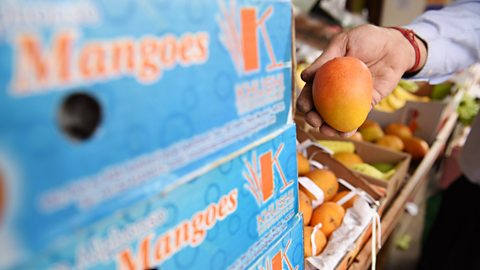Case study - attempts to achieve food security in the UK
There is enough food to feed everyone on the planet, but globally there are still 1 billion people experiencing food insecurityWhen people do not have enough nutritious and affordable food to eat.. Food supply and consumption are not evenly distributed.
The UK does have food securityWhen people have enough nutritious and affordable food to eat.. Around 40% of the UK's food has been imported and much of it has been processedWhen something has been changed to make it more attractive to buyers, eg milk is processed to make it safe and healthier to drink..
The growing demand for food imports

In the past, people ate food that was in seasonOne of four times of the year (winter, spring, summer or autumn)., eg cabbages and leeks in the winter and tomatoes and cucumbers in the summer. Nowadays, people in wealthier nations can eat any type of food at any point in the year. Heated greenhouses allow crops to grow out of season and cold storage allows food to be transported from other parts of the world.
trans-national corporation (TNC)A company that operates in many different countries. (TNCs) work in several different countries, processing food and exporting it across the globe.
The demand for organic produce
organicGrown without the use of artificial pesticides and fertilisers, or relating to or coming from living matter. foods are grown without using any chemicals. They use natural fertiliserA nutrient added to the soil to increase the soil fertility., such as animal manure, and natural predators instead of chemical pesticideA chemical used to kill pests, such as the potato cyst nematode which is a pest that destroys potato crops.. The consumption of organic produce has risen in the UK as fewer people are prepared to eat food that has been sprayed with harsh chemicals.
When farmland is converted to become organic, yieldThe amount of crops harvested from a certain area. are usually lower than those from inorganic crops but the difference varies between types of crop and over time. Organic farms are thought to be environmentally sustainableAn activity which does not consume or destroy resources or the environment., in that they don't use artificial chemicals. Some people believe that organic farming is unsustainable as it can lead to a greater use of land area.
Ethical consumerism
Ethical consumerism is the purchase of products and services that have been provided in a way that minimises social and environmental damage. Products might include food and drink goods, travel plans, or financial services.
Fair trade arrangements can be put in place when trade between countries is not restricted by import duties or by not being a member of a group of trading nations. The main principle behind fair trade is to ensure that producers (usually farmers) receive a fair price for their goods.
Local food sourcing is a method of food production and distribution that is local rather than national or international. Food is produced close to consumers, and then distributed over much shorter distances - reducing 'food miles'. This is supported by the growing trend of farmers' markets.
Responsible food storage and consumption has helped to reduce wasted food supplies. A good deal of disposed food waste is now being reused to produce energy.
Intensive commercial farm production
Intensive farming operations have high inputs (eg fertilisers, machinery, labour) and produce high yields from the amount of land available. However, there are drawbacks to this increase in productivity, and many associated damaging environmental effects.
Technical developments
- Biotechnology - genetic engineering to produce useful commercial products such as pest-resistant crops.
- Hydroponics - method of growing plants using mineral nutrient solutions, in water without soil.
- Aeroponics - growing plants in an air or mist environment without the use of soil.
- Irrigation - the application of water to land in order to supply crops with necessary water for growth.
- Green revolution - term used to describe the large increase in crop production especially in poorer countries, achieved by the use of high-yielding crop varieties (mainly cereal crops), artificial fertilisers and pesticides.
- Blue revolution - the rapid growth of aquaculture (cultivation of freshwater or marine plants and animals). This includes the development of fish farming where farmers rear fish and shellfish in enclosed ponds and tanks.
Food security on a local scale
- Urban farming - growth of fruit, herbs and vegetables and the raising of livestock in towns and cities. Can include allotment farming.
- Vertical farming - a type of urban farming where food is cultivated within a skyscraper greenhouse or on an exterior wall.
- Permaculture - a philosophy of working with rather than against nature. It simulates or directly uses patterns and features observed in actual ecosystems.
- Food banks - support people with personal food insecurities.